Conservative Internationalism : Armed Diplomacy under Jefferson, Polk, Truman, and Reagan / Henry R. Nau.
Material type: TextPublisher: Princeton, NJ : Princeton University Press, [2015]Copyright date: ©2015Edition: Pilot project. eBook available to selected US libraries onlyDescription: 1 online resource (352 p.) : 1 halftone. 3 line illus. 1 table. 2 mapsContent type:
TextPublisher: Princeton, NJ : Princeton University Press, [2015]Copyright date: ©2015Edition: Pilot project. eBook available to selected US libraries onlyDescription: 1 online resource (352 p.) : 1 halftone. 3 line illus. 1 table. 2 mapsContent type: - 9780691168494
- 9781400873722
- 327.73009/034 23
- E183.7 .N38 2015eb
- online - DeGruyter
- Issued also in print.
| Item type | Current library | Call number | URL | Status | Notes | Barcode | |
|---|---|---|---|---|---|---|---|
 eBook
eBook
|
Biblioteca "Angelicum" Pont. Univ. S.Tommaso d'Aquino Nuvola online | online - DeGruyter (Browse shelf(Opens below)) | Online access | Not for loan (Accesso limitato) | Accesso per gli utenti autorizzati / Access for authorized users | (dgr)9781400873722 |
Frontmatter -- Contents -- Preface to the Paperback Edition -- Acknowledgments -- Introduction. Traditions of the Eagle -- Chapter 1. What Is Conservative Internationalism? -- Chapter 2. America's Foreign Policy Traditions -- Chapter 3. Recent Presidents: THE PENDULUM SWINGS -- Chapter 4. Thomas Jefferson: EMPIRE OF LIBERTY -- Chapter 5. James K. Polk: MANIFEST DESTINY -- Chapter 6. Harry S. Truman: LIBERTY IN WESTERN EUROPE -- Chapter 7. Ronald Reagan: LIBERTY IN EASTERN EUROPE -- Conclusion: FREEDOM AND FORCE -- Notes -- Index
restricted access online access with authorization star
http://purl.org/coar/access_right/c_16ec
Debates about U.S. foreign policy have revolved around three main traditions--liberal internationalism, realism, and nationalism. In this book, distinguished political scientist Henry Nau delves deeply into a fourth, overlooked foreign policy tradition that he calls "conservative internationalism." This approach spreads freedom, like liberal internationalism; arms diplomacy, like realism; and preserves national sovereignty, like nationalism. It targets a world of limited government or independent "sister republics," not a world of great power concerts or centralized international institutions.Nau explores conservative internationalism in the foreign policies of Thomas Jefferson, James Polk, Harry Truman, and Ronald Reagan. These presidents did more than any others to expand the arc of freedom using a deft combination of force, diplomacy, and compromise. Since Reagan, presidents have swung back and forth among the main traditions, overreaching under Bush and now retrenching under Obama. Nau demonstrates that conservative internationalism offers an alternative way. It pursues freedom but not everywhere, prioritizing situations that border on existing free countries--Turkey, for example, rather than Iraq. It uses lesser force early to influence negotiations rather than greater force later after negotiations fail. And it reaches timely compromises to cash in military leverage and sustain public support.A groundbreaking revival of a neglected foreign policy tradition, Conservative Internationalism shows how the United States can effectively sustain global leadership while respecting the constraints of public will and material resources.
Issued also in print.
Mode of access: Internet via World Wide Web.
In English.
Description based on online resource; title from PDF title page (publisher's Web site, viewed 30. Aug 2021)


